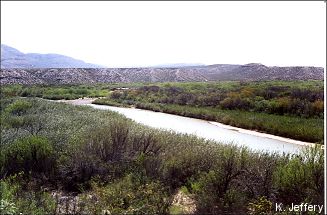

Desert dwellers tend to be more attuned to water shortages than those who live in damper climates, yet even we tend to underestimate the enormity of the problem.
According to recent publications, freshwaters on a worldwide basis provide about 12% of all human-consumed fish, about 40% of agricultural crops rely on irrigation, and an estimated 12% of animal species are dependent on freshwater ecosystems. Under current consumption patterns, 48% of humans will live in water-stressed river basins by 2025.
Our own Rio Grande drainage is projected to have more than 10 million inhabitants by then, with renewable water supplies of less than 1000 cubic meters per person per year. This figure takes on real meaning when we realize that water scarcity begins at 2500 cubic meters, more than two and one-half times our projected supply.
Within the Chihuahuan Desert, Ciudad Juárez has been projected
by some to have less than a 5-year supply of water, and estimates for El Paso tend to
cluster around 30 years. It's small consolation that we are in good company.

Contributor: Arthur H. Harris, Laboratory for Environmental Biology, University of Texas at El Paso.
Desert Diary is a joint production of the Centennial Museum and KTEP National Public Radio at the University of Texas at El Paso.

The Rio Grande in the Big Bend. Photograph by Kodi Jeffery. ![]()
Johnson, N., C. Revenga, and J. Echeverria. 2001. Managing Water for People and Nature. Science 292:1071-1072.
![]()